On May 25, 2020, the world witnessed the extremes of racism.
A racist policeman killed a black man for nothing worth it.
The truth is, nothing except the courts should take a man’s life.
But unfortunately, this young man was killed recklessly despite repeatedly saying he couldn’t breathe.
This man was George Floyd.
He was 46 years old and was allegedly accused of a $20 scam bill.
Quickly, he was arrested by white police officers who handcuffed him.
Despite being already handcuffed, he was pulled to the ground on insinuations that he was resisting arrest.
Multiple videos released so far didn’t reveal a dangerous resistance by George Floyd.
Notwithstanding, he was forcefully pulled to the ground and held in position by three officers while the last officers prevented bystanders from helping out.
One of the police officers restricted his legs and the other his back.
Even worse was a now ex-police officer, Chauvin, who intentionally placed his knee on the neck of George Floyd for nearly 9 minutes.
During those periods, in the video, George Floyd could be heard saying multiple times that “he couldn’t breathe.”
Yet, The police officer wasn’t even moved to show sympathy or pity.
George Floyd was later confirmed dead by medics who arrived at the scene.
While all officers have been charged to court, it doesn’t bring back the life of George Floyd.
So, what does the bible say then about racism?
Does God accept people to be unfairly treated because of the color of their skin?
I have put together bible verses against racism to inspire Christians to always love one another.
Bible verses against Racism
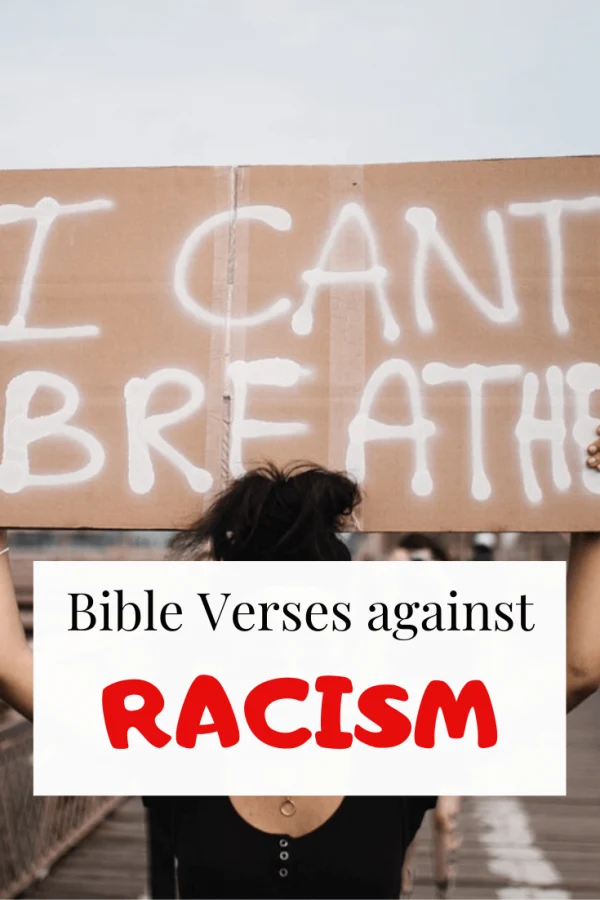
1. Genesis 1:26 NIV
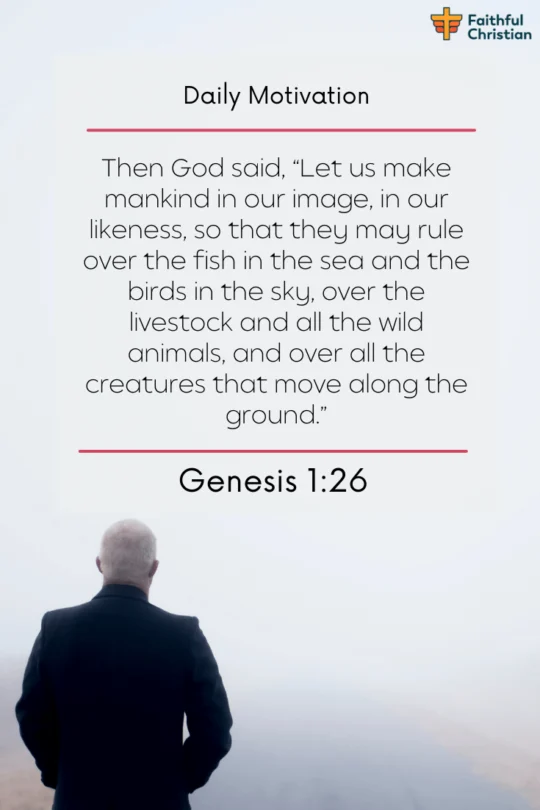
Then God said, “Let us make mankind in our image, in our likeness, so that they may rule over the fish in the sea and the birds in the sky, over the livestock and all the wild animals,[a] and over all the creatures that move along the ground.”
Genesis 1:26 serves as a cornerstone in understanding human worth. Here, God sculpts humanity in His image. This moment births the Imago Dei, the divine likeness present in each of us.
What does this mean? Simply put, when I see my reflection each day, I see a hint of God. More so, I also see it in the person standing next to me.
Our divine image shatters racial bias. Look around, we’re all God’s masterpiece. No matter our race, we’re shaped by the same divine hands.
As Psalms 139:14 puts it, we are “fearfully and wonderfully made”. Our shared creation is our common thread, binding us together in beautiful diversity.
This shared creation confers equality. Acts 17:26 drives this point home: “made from one man every nation of mankind to live on all the face of the earth”. Thus, we’re all equals in God’s sight, unified in our diversity.
The key takeaway here? Mutual respect. Acknowledge our shared origin, and celebrate it. Our differences don’t make us less worthy of respect; they enrich God’s creation.
Let’s dive into a biblical example for a clearer picture. Do you remember the story of the Good Samaritan in Luke 10:25-37? Jesus used a Samaritan, a race despised by the Jews, to illustrate true neighborliness.
The Samaritan, despite his societal standing, embodied God’s love and compassion, challenging the deep-seated racism of that era.
This narrative reinforces our understanding of Genesis 1:26, reminding us that love, kindness, and dignity are not bound by racial or societal norms.
In the U.S., Martin Luther King Jr. applied this truth during the Civil Rights Movement. He urged society to remember Genesis 1:26, that all humans are equal. His famous speech dreamt of a world not divided by color, but united by character.
The Imago Dei concept challenges racism. If I see the divine image in others as I do in myself, discrimination becomes impossible.
In conclusion, Genesis 1:26 is a mirror reflecting our divine likeness. It calls us to honor our shared humanity. As we face this mirror, let’s celebrate our common creation, fostering respect and unity.
2. Genesis 3:20 NIV

Adam named his wife Eve, because she would become the mother of all the living.
Genesis 3:20 sounds simple, doesn’t it? Yet, it’s a potent statement against racism.
Eve, our first woman, is the mother of us all. This idea has profound implications. It portrays a vivid picture of universal kinship. We all share the same ancestry, regardless of our race or nationality.
This shared lineage promotes unity and equality. It encourages us to appreciate our common human heritage, extending beyond superficial differences.
Some narratives propagate racial hierarchies. They suggest superiority or inferiority based on race. But, these ideas falter against the Bible’s understanding of our shared origin. It erodes the notion of racial superiority, emphasizing our common descent from Eve.
We are all threads in the intricate tapestry of the human family. Every person is equally deserving of respect, dignity, and love. This recognition helps us combat racism.
The Apostle Paul, in Acts 17:26, reiterates this universal kinship, “From one man he made all the nations.” His words challenged racial pride, underscoring our shared humanity.
Real-life anti-racism movements have also hinged on this shared origin. Nelson Mandela, fighting against apartheid in South Africa, emphasized our common humanity. His efforts led to the dismantling of racial divisions.
Malachi 2:10 asks, “Do we not all have one Father? Did not one God create us?” The prophet emphasizes unity and equality, reinforcing the Bible’s stand against racism.
So, when we read Genesis 3:20, let’s remember our shared mother, Eve. She symbolizes universal kinship. I trust, as you do, that understanding our shared origin can aid in eradicating racism.
This will allow humanity to flourish in its beautiful diversity.
3. Galatians 3:28 NIV
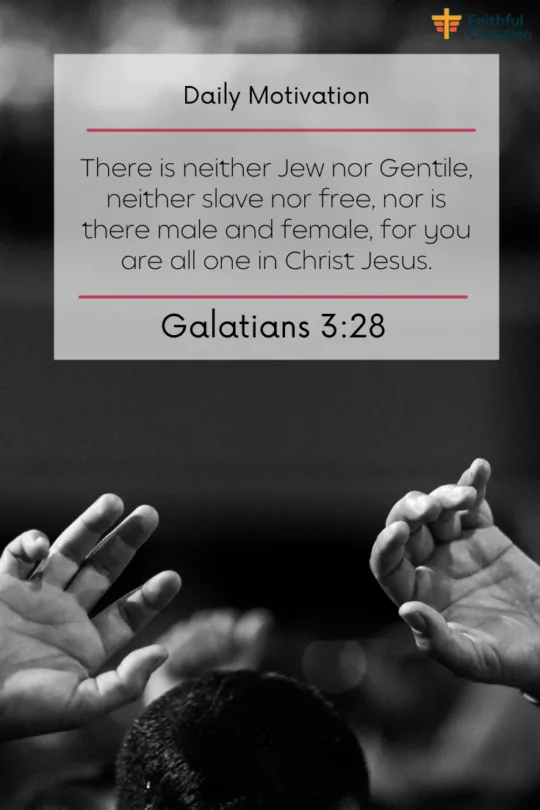
There is neither Jew nor Gentile, neither slave nor free, nor is there male and female, for you are all one in Christ Jesus.
Have you ever wondered about the Bible’s stance on racism? It’s a valid question and Galatians 3:28 provides a powerful answer.
The Apostle Paul shares an incredible truth: “There is neither Jew nor Gentile, neither slave nor free, nor is there male and female, for you are all one in Christ Jesus.”
Paul’s words stand in stark contrast to the deep societal divisions of his time. He declares that in Christ, all boundaries crumble. Whether societal, racial, or gender-based, these walls fall before Christ’s all-encompassing love.
What’s more, this verse doesn’t merely champion unity; it emphasizes equality. It is a direct and powerful rebuke of racism. In the eyes of God, all believers, no matter their race, stand equal. Such a stand remains true for us today.
We see this transformative power of the Gospel in action in Ephesians 2:14 and Romans 10:12. These verses confirm that Christ has dismantled the “dividing wall of hostility.”
They affirm that Jew or Gentile, there’s no difference. The Gospel’s impact is evident. It champions unity, equality, and embraces all of humanity, showcasing God’s heart.
The early church reflects this truth powerfully. The inclusion of Gentiles in Acts 10 and 11 symbolizes the demolition of racial and cultural barriers. This act is a live testimony to the Gospel’s power to fight racial discrimination and promote unity.
This Biblical truth isn’t confined to the past; it resonates in our modern society. The 20th-century church’s racial integration reflects Galatians 3:28 in action.
Brave leaders opposed racial segregation, affirming that racial distinctions don’t exist in Christ. As a result, they transformed their communities, upholding Paul’s words.
So, what’s the takeaway today? Galatians 3:28 calls us to live the unity and equality found in Christ.
It urges us to reject racism and to treasure the diverse body of Christ. It’s not just a verse—it’s a guide to living out our faith, shaping how we interact with others.
As we digest this, let’s strive to create communities that reflect the unity and equality that Christ taught us.
4. Colossians 3:25 NIV
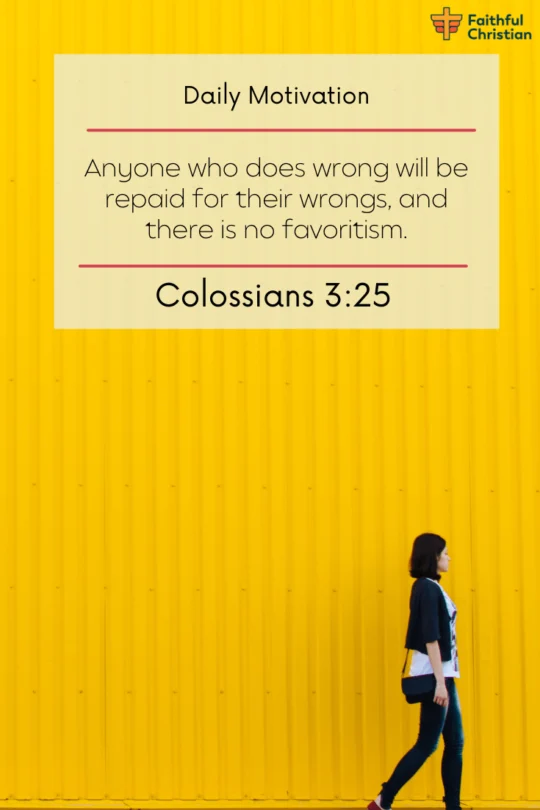
Anyone who does wrong will be repaid for their wrongs, and there is no favoritism.
Colossians 3:25 is a vivid scriptural picture of God’s divine justice: “Anyone who does wrong will be repaid for their wrongs, and there is no favoritism.” This scripture reminds us of God’s impartiality.
Dive with me into a riveting tale from the Old Testament – the story of Jonah. Tasked with preaching in Nineveh, a city of ill-repute, Jonah fled. Prejudiced against the Ninevites, he ignored God’s command.
However, a harrowing encounter with a giant fish taught Jonah an invaluable lesson – God’s justice and mercy are universal.
This tale prompts us to scrutinize our prejudices. It encourages us to see everyone through the lens of God’s impartiality.
Romans 2:6 reinforces this idea. It reminds us that God “will repay each person according to what they have done.”
Matthew 16:27 amplifies this by stating that Jesus will “reward each person according to what they have done” when He returns.
Let’s fast-forward from biblical times to the 20th century. The Nuremberg Trials, conducted after World War II, upheld the principle that no one is above the law.
These trials emphasized that justice doesn’t distinguish between color, creed, or rank. It holds us accountable for our actions.
Such narratives guide us towards impartiality and fairness, challenging racial bias. Racial discrimination contradicts divine justice, as portrayed in Colossians 3:25.
So, what can we do to uphold these teachings in our lives? The first step is to recognize and rectify our biases. Treat all individuals with respect, disregarding race or ethnicity. Embrace the teachings of these scriptures and stand firm against racism.
In doing so, we can create a world mirroring God’s justice and impartiality. We can shape a world where everyone receives the dignity they deserve.
As a Christian, I urge you to reflect on these scriptures. As an individual, I challenge you to embody these teachings in your daily actions. Together, let’s create a fair and just world.
More bible verses about racism
Acts 10:34 NIV
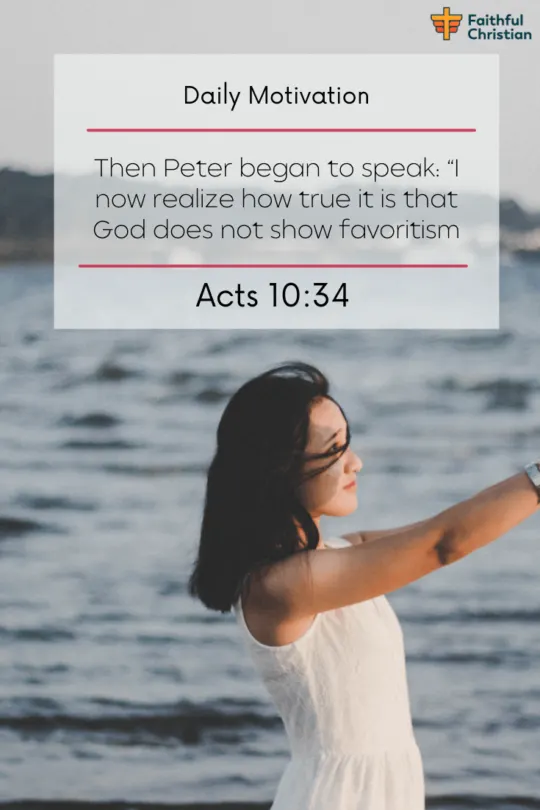
Then Peter began to speak: “I now realize how true it is that God does not show favoritism
A fascinating tale unfolds in Acts chapter 10. Peter, deep in prayer, sees a vision that changes his life. He sees a sheet descend from the sky, teeming with animals of all kinds. God tells him to eat. He refuses. Then comes the divine lesson: nothing God made is unclean.
Imagine Peter’s surprise! His life-long beliefs were uprooted in an instant. This was no minor change, but a total shift in worldview. What was once “unclean” was now deemed clean by God. The Holy Spirit had radically altered Peter’s perspective, making room for a beautiful truth: God is impartial.
Reflecting on Deuteronomy 10:17, it declares God as the “great God, mighty and awesome, who shows no partiality.”
Echoing the same is 2 Chronicles 19:7, it underlines the divine impartiality Peter witnessed. God, in His infinite wisdom, sees beyond human classifications like race or status.
For us, this insight dismantles racial biases. If God doesn’t discriminate, should we? The Bible, particularly verses like Acts 10:34, promotes inclusivity and equality. In God’s eyes, we are all equal, regardless of our race or ethnicity.
The Church’s role is crucial here. It must model God’s impartiality and promote inclusion in our Christian community. Peter’s vision led to an all-embracing Christian mission, breaking barriers of race and ethnicity.
Our faith compels us to reject prejudice and mirror God’s unbiased love. As God guided Peter, let’s shun bias, embracing all our brothers and sisters in Christ.
I believe, if we follow these principles, we’ll make significant strides against racism. As God accepts all who fear Him, so should we.
Romans 2:11 NIV
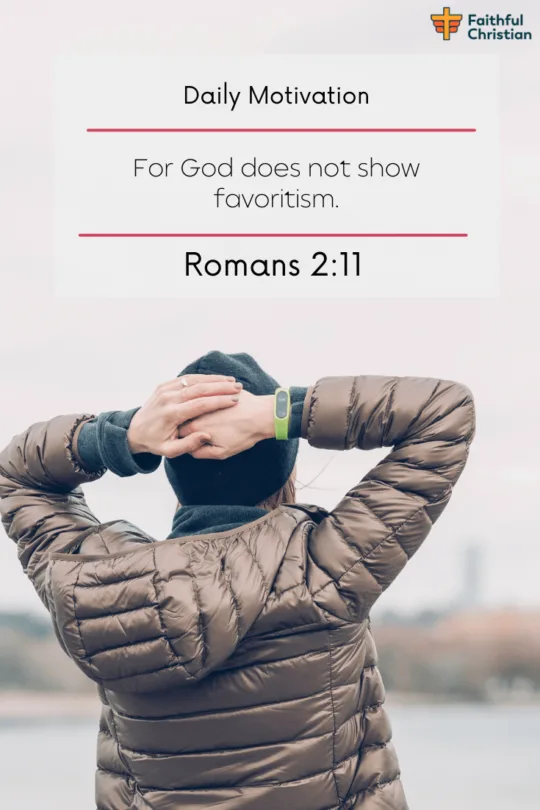
For God does not show favoritism.
The heart of the Bible resounds with a clear truth – God plays no favorites. This message from Romans 2:11, declared by Paul, a key figure in the early Christian Church, shines a light on our world today, often scarred by bias and prejudice.
Before we dive in, let’s frame who Paul was. Once a fervent Christian persecutor, his transformation after meeting the risen Christ revealed to him God’s all-embracing grace.
This grace transcends our human divides, and that’s the marvel of divine justice. It pays no heed to our human-made barriers.
Other scriptures mirror this sentiment. Ephesians 6:9 and 1 Peter 1:17 echo the fact that God judges impartially. He doesn’t discern race, color, or creed, but our hearts.
This divine impartiality isn’t a distant theological concept. It’s a call to challenge our own prejudices. If we believe in equality before God, we must translate this belief into action.
Take the Biblical story of Rahab. A Canaanite woman, Rahab, despite belonging to a race despised by the Israelites, aided Israelite spies, showing faith in their God. God’s response? Pure mercy. Her ethnicity didn’t matter; her faith did.
In history, the fight against slavery provides a striking example. William Wilberforce, an abolitionist driven by Christian conviction, made significant strides in ending the slave trade in Britain. His belief in divine impartiality didn’t just alter his world-view; it changed the world.
If we claim to believe in God’s impartiality, we must strive to live it out. This means confronting racial prejudice head-on. It requires us to challenge our biases, foster open conversations, and try to perceive others as God does – as equally loved and valuable.
In conclusion, Romans 2:11 isn’t just scripture. It’s a roadmap to combating racial prejudice. A true understanding of God’s impartiality breaks barriers and fosters unity.
Isn’t this what the world needs now? I think it is, and I hope you do too.
1 Thessalonians 4:6 NIV
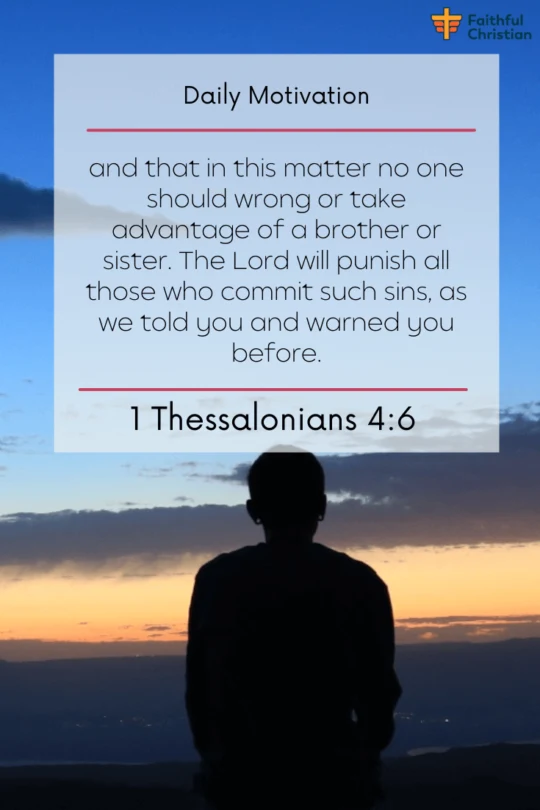
and that in this matter no one should wrong or take advantage of a brother or sister.[a] The Lord will punish all those who commit such sins, as we told you and warned you before.
In our quest to understand the Bible’s stand on racism, 1 Thessalonians 4:6 resonates. Paul advises against mistreating anyone, especially a brother.
Although initially about sexual immorality, the heart of this advice applies to racial relations too.
Leviticus 19:15 echoes Paul’s words. It warns us not to skew justice in favor of either the poor or the rich. Proverbs 24:23 also echoes these sentiments, speaking against bias in judgment. In essence, these scriptures stress that justice must not bend to bias.
Let’s put this into context. Consider the biblical story of Joseph. His older brothers, consumed by envy, sold him into slavery. This was an act of profound injustice, deeply rooted in bias and prejudice. It was a tragic example of what happens when we “wrong” others, particularly those in our own family.
While this story doesn’t directly address racism as we understand it today, the foundational issue – bias leading to harm – is closely related. We are reminded that God later condemned this act, revealing His commitment to justice and fairness.
Today, I see echoes of these biblical teachings in the #BlackLivesMatter movement. It stands against persistent racial bias, embodying the principle of challenging injustice. It’s a modern response to unfair treatment, similar to the issues underscored in our scriptures.
So, how should we respond today? As Christians, our task is to be active allies against racial bias. We must listen, learn, empathize, and above all, act. Our faith should make us advocates for the marginalized, using our influence to effect change.
In my view, battling racism starts internally. We must scrutinize our biases and work on dismantling them. This introspection should spread to our communities, families, workplaces, and eventually, society at large. Ensuring justice is a lived reality is our collective responsibility.
In sum, our faith calls us to not harm others, an edict that absolutely includes racial relations. Striving to live by this teaching, we could make significant progress towards eliminating racism, fostering unity, and mirroring God’s all-encompassing love.
Deuteronomy 10:17 NIV

For the Lord your God is God of gods and Lord of lords, the great God, mighty and awesome, who shows no partiality and accepts no bribes.
God’s nature, as shown in Deuteronomy 10:17, is clear: He is impartial and just. He neither favors nor discriminates. His justice is colorblind.
To grasp this, let’s delve into the Old Testament. It gives us a firm picture of God’s fairness. This image is fortified by verses like 2 Chronicles 19:7 and Job 34:19.
Both scriptures echo the same message: God treats everyone equally, irrespective of status or wealth. He’s the ultimate embodiment of justice, unfettered by bias.
Deuteronomy 10:17 does more than describe God’s impartiality. It actively opposes favoritism, racial bias included. It challenges any claim of racial superiority. It affirms that God doesn’t judge us based on race, but on our hearts.
Recognizing God’s character as the fair Judge encourages us to uphold justice in society. After all, we are called to mirror His character.
A reflection of this can be found in the Biblical example of the Israelites’ treatment of foreigners. As God commanded them to love foreigners as themselves (Leviticus 19:34), He was calling them to exercise justice and impartiality, just like Him.
So, how can we contribute to racial justice? We can start by confronting our own biases. We can also work towards unity in our communities. This implies fostering environments where everyone, regardless of race, feels valued.
One embodiment of this justice is the Universal Declaration of Human Rights. It champions human equality on a global scale. Similarly, we must promote justice in our immediate environments.
The essence of our journey is understanding that God is the perfect Judge. Like Him, I believe we are tasked to uphold justice and equality. I hope we all choose to fight against racism, showcasing God’s unbiased love in our everyday actions.
1 Samuel 16:7 NIV
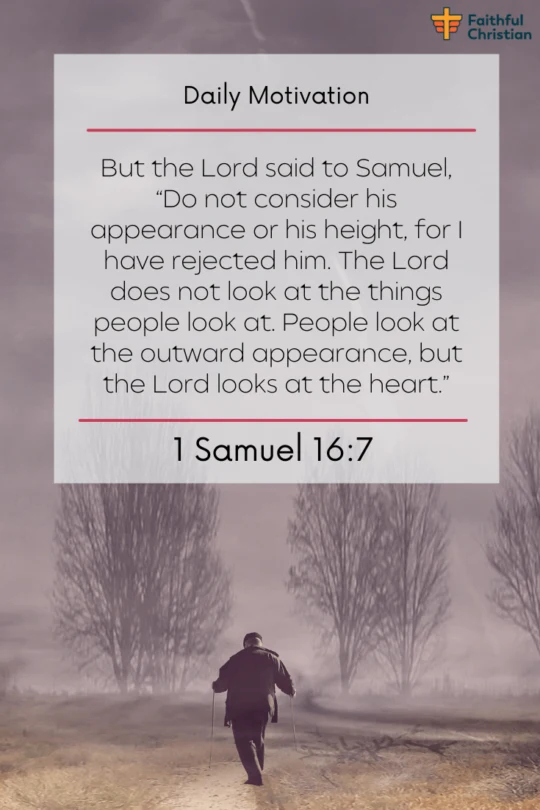
But the Lord said to Samuel, “Do not consider his appearance or his height, for I have rejected him. The Lord does not look at the things people look at. People look at the outward appearance, but the Lord looks at the heart.”
Imagine a tall, muscular man walking into a room. He captures attention instantly. Is greatness his destiny? Not necessarily. Let’s explore why, using the Bible as our guide.
In 1 Samuel 16:7, we uncover a riveting tale. It’s the story of David’s anointment as king. This scripture challenges our instinct to judge people based on their looks.
It reads, “The LORD does not look at the things people look at. People look at the outward appearance, but the LORD looks at the heart.”
This verse criticizes our habit of judging others by their physical looks. In our society, we often let race color our opinions about others. This verse teaches us that what matters is not race or physical features, but the heart within.
God chose David over his older brothers not for his looks, but for his heart. This lesson encourages us to focus on the character, not the color of one’s skin.
Jeremiah 17:10 supports this, saying, “I, the LORD, search the heart, I test the mind.” This means God cares more about our hearts and actions than how we look.
How can we apply this lesson? It’s simple. We must strive to see beyond the surface. By doing so, we foster racial harmony. We start seeing our shared humanity, not our different skin tones.
Take, for instance, the inspiring story of Ruby Bridges. As a six-year-old black girl in a previously all-white school, she faced vile racism daily.
Yet, Ruby refused to let the color of her skin define her. Exhibiting a heart full of courage and forgiveness, she emerged as a beacon of hope, becoming a pivotal figure in American Civil Rights history.
Revelations 2:23 adds to this, with Christ saying, “And all the churches will know that I am He who searches the minds and hearts.” We should remember that our hearts and actions matter more to God than our races.
In sum, 1 Samuel 16:7 delivers a powerful message against racism. It calls us to see beyond appearances and value people’s hearts and characters. As Christians, we should strive to emulate this practice in our everyday lives.
John 7:24 NIV
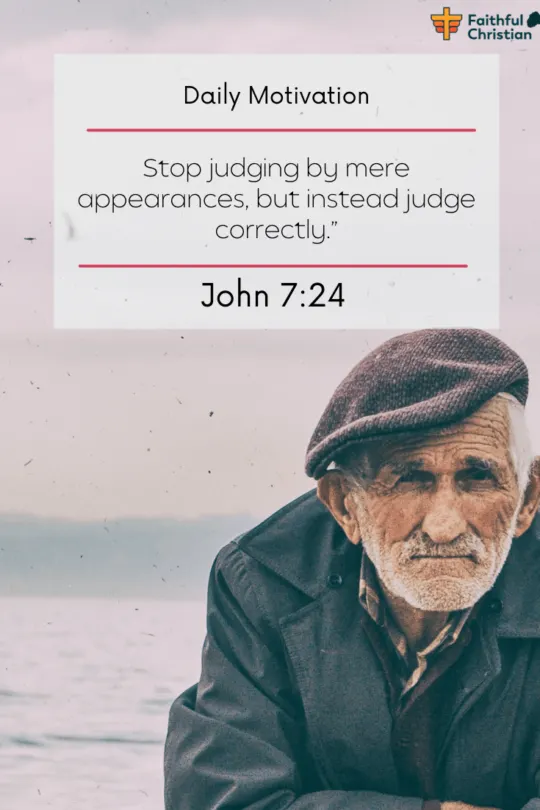
Stop judging by mere appearances, but instead judge correctly.”
Imagine Jesus laying out a roadmap to tackle racism. His wisdom transcends centuries, remaining impactful today.
One striking instruction is found in John 7:24 – “Do not judge by appearances, but judge with right judgment.” What does it mean, and how can it help us combat racial discrimination? Let’s explore.
Jesus lived in a society marked by division – racial, social, religious. Yet, he openly defied these barriers. Take, for instance, the encounter with the Samaritan woman (John 4:1-42).
It was uncommon for Jews and Samaritans to interact, yet Jesus didn’t hesitate to converse with her. He looked past her nationality, focusing on her heart.
To me, this captures the essence of ‘righteous judgment’ – prioritizing internal worth over external labels.
Fast forward to 1967, the Loving v. Virginia case echoed this principle. A mixed-race couple, Richard and Mildred Loving, stood up against discriminatory marriage laws.
Their love story resulted in a landmark victory for ‘righteous judgment’, emphasizing the importance of looking past racial lines.
Isaiah 11:3-4 presents a vision of a leader, seen in Jesus, who “will not judge by what he sees with his eyes…but with righteousness.” Embracing ‘righteous judgment’ can fuel our fight against racism.
To achieve this, we need to heed the wisdom of James (James 2:4) – reject assumptions, unlearn biases, and foster open-mindedness.
As Christians, our call is not just to be non-racist but anti-racist. We’re tasked with promoting equality, justice, and reconciliation – upholding ‘righteous judgment’ in our society.
In essence, John 7:24 offers more than a moral suggestion. It’s a rallying cry to Christians everywhere to oppose racism. When we choose ‘righteous judgment’ over superficial judgment, we make strides towards a world united in its diversity.
In becoming more like Christ, remember: each step towards ‘righteous judgment’ is a step away from racism.
More bible verses about racism and discrimination
Jeremiah 17:10 (NIV)
Luke 16:15 (NIV)
Exodus 22:21 (NIV)
Deuteronomy 10:19 (NIV)
Leviticus 19:33 (NIV)
Frequently Asked Questions
What are some Bible verses about black and white?
When it comes to racial or ethnic distinctions, the Bible does not specifically mention “black and white.” However, it affirms the unity and equality of all individuals before God.
A clear message comes from Galatians 3:28. It says we are all one in Christ Jesus, no matter if we’re Jew or Greek, slave or free, male or female.
Peter, in Acts 10:34-35, adds that God doesn’t show favoritism. He accepts anyone from any nation who respects Him and does what’s right. These passages tell us that God’s love transcends racial or ethnic boundaries.
What does the Bible say about discrimination?
The Bible views discrimination as unacceptable. It’s seen in James 2:9, where partiality is described as sin. Showing favoritism, it says, makes us lawbreakers.
Leviticus 19:15 also addresses discrimination. It urges us to treat everyone fairly. This instruction comes without exceptions: do not favor the poor or the great, but judge your neighbor justly.
These scriptures clearly promote fairness and justice for all people.
Are there any Bible verses against tribalism?
The Bible doesn’t explicitly address tribalism, or favoritism toward one’s group. However, the principles of love, unity, and acceptance apply here.
In Matthew 22:39, Jesus tells us to love our neighbors as ourselves. In Galatians 3:28, Paul highlights the unity in Christ. Here, all ethnic and social divisions become insignificant.
These teachings encourage unity among people, no matter their tribal or ethnic background.
Is there a Bible verse that affirms God’s love for all races?
God’s love for all races and nations is affirmed throughout the Bible.
One of the most famous verses, John 3:16, tells us that God loved the world so much, He gave His one and only Son. This world includes all nations, races, and ethnicities.
In Revelation 7:9, a vision depicts people from every nation, tribe, and language before God’s throne. This shows God’s plan for all races in His eternal kingdom.
Could you provide some Bible verses about ethnicity?
Ethnicity, according to the Bible, doesn’t create division but unity before God. Revelation 7:9 depicts a heavenly vision of every nation, tribe, and people standing before God.
Acts 17:26 reminds us that God created all the nations from one man. These scriptures highlight the idea that God values all ethnicities equally.
What biblical verse is against slavery?
The Bible clearly condemns slavery and any form of human oppression. Galatians 3:28, written by Paul, speaks to the equality of all people in Christ Jesus. This includes those enslaved and those free.
In 1 Timothy 1:10, enslavers, those who force others into slavery, are categorized as sinful and contrary to God’s teachings. These verses emphasize the value of freedom and equality in the eyes of God.
